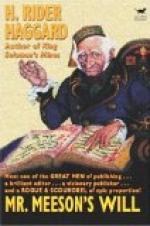“Eustace,” she said to her sleeping spouse, “wake up, I want to say something to you.”
“Eh! what’s the matter?” said Eustace, yawning.
“Eustace, we are too rich—we ought to do something with all this money.”
“All right,” said Eustace, “I’m agreeable. What do you want to do?”
“I want to give away a good sum—say, two hundred thousand, that isn’t much out of all you have—to found an institution for broken-down authors.”
“All right,” said Eustace; “only you must see about it, I can’t be bothered. By-the-way,” he added, waking up a little, “you remember what the old boy told you when he was dying? I think that starving authors who have published with Meeson’s ought to have the first right of election.”
“I think so, too,” said Augusta, and she went to the buhl writing-table to work out that scheme on paper which, as the public is aware, is now about to prove such a boon to the world of scribblers.
“I say, Gussie!” suddenly said her husband. “I’ve just had a dream!”
“Well!” she said sharply, for she was busy with her scheme; “what is it?”
“I dreamt that James Short was a Q.C., and making twenty thousand a year, and that he had married Lady Holmhurst.”
“I should not wonder if that came true,” answered Augusta, biting the top of her pen.
Then came another pause.
“Gussie,” said Eustace, sleepily, “are you quite happy?”
“Yes, of course I am, that is, I should be if it wasn’t for those footmen and the silver water-jugs.”
“I wonder at that,” said her husband.
“Why?”
“Because”—(yawn)—“of that will upon your neck”—(yawn). “I should not have believed that a woman could be quite happy”—(yawn)—“who could—never go to Court.”
And he went to sleep again; while, disdaining reply, Augusta worked on.



